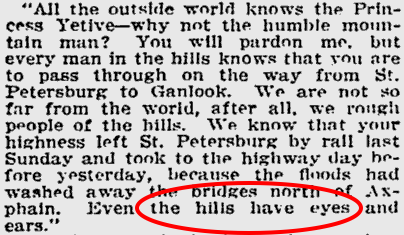I'm under the impression that the phrase "the hills have eyes" predates the movie (including the 1977 one), but I can't find any use of it on Google. How can I find out if the phrase existed first?
2 Answers
I found an earlier appearance in the 1904 novel Beverly of Graustark by George Barr McCutcheon. This is on page 39:

Even the hills have eyes and ears.
The Oxford Dictionary of Proverbs has similar phrases going back a long way, but not "the hills have eyes" specifically.
"The fields have eyes and the woods have ears" is used by Chaucer in The Knight's Tale:
But sooth is seyd, go sithen many yeres
That "feeld hath eyen and the wode hath eres."
But the origin is older even than that. A thirteenth century manuscript in Trinity College, Cambridge has Veld haveð hege, and wade haveð heare with the Latin translation Campus habet lumen et habet nemus auris acumen. At about the same time, it appears in the work of the German poet Reinmar von Zweter: Walt hat oren, velt gesiht.
"The walls have ears" is traced to 1592 (G. Delamothe, French Alphabet ii. 29), linked to the French parallel Les murailles ont des aureilles. This may be the oldest form of all: it appears in the Vayikrah Rabbah (c. 5th-7th century) as
-
7Great answer! All assiduously tracked down, plus I like the way you show how the whole 'family' of related phrases can drift in and out of currency. Commented Jul 17, 2011 at 21:57
In the past, even perhaps, today, goat herds and sheep herders knew well the ideal green pastures on top of hills and in the valleys around villages, they used to call the flock of sheep or goat to gather. By way of echoes the valley transmitted the sound of the herder, and his flock would hear it and come to him. Hence, old men of the villages in N Lebanon say that "mountains and valleys have ears" since they transmit the sounds by way of echo. That what they believe only.
About "walls have ears": Lebanese famous author Anis Freyha, said that the source of the saying: "walls have ears" derived from Ludovico Ariosto, Italian author and poet who died in 1533 (in Lebanese: الحيطان إلها آذان (walls have ears). I included the translation into Arabic / Lebanese.
الحيطان إلها آذان (أو ذَيْنَين) (أنيس فريحة:1496 ص281) القول "للجدران آذان" هو للشاعر الإيطالي لودوفيكو أريوسطو، أواخر الجيل السادس عشر. (أردني: "الجدار لها آذاني").
Moreover, another idiom: الليل له ذينين (the night has ears) is local, I reckon, and many do believe that during night time a minor conversation can be heard from long distance. Now therefore, silence during night time, would allow us to listen from long distances. Please let me know if that helps. S A Moubarak
-
Be aware that herbage is common slang for the various cannabis spp., especially in their leafier and more floral forms. You might prefer foliage or vegetation instead.– tchrist ♦Commented Mar 29, 2014 at 18:39
-
I like this answer as it explains that the idea of hills, valleys, and mountains having eyes and ears is a universal one and predates a 1970s occidental film. Commented Mar 29, 2014 at 18:39
-
